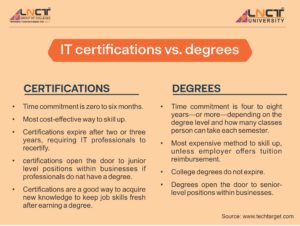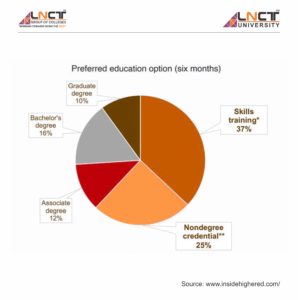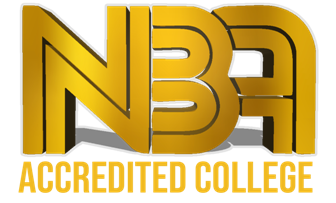CERTIFICATION VS. DEGREE
- How would you define a professional degree?
- How would you define certification?
- Certification vs. Degree
- What are the pros and cons of pursuing a professional degree?
- What are the pros and cons of the certificate?
- What does the future hold for certification versus traditional degrees in India?
If you’re weighing your educational options and thinking between pursuing a certificate course or a degree, this blog is made to address your considerations, taking into account that the learning process differs for each individual based on their primary objectives.
Although both options offer advantages, making the decision between certification vs. degree ultimately relies on your goals and preferences. However, familiarizing yourself with the crucial factors in the Certification vs. Degree debate can assist you in making a well-informed choice aligned with your career aspirations.
The traditional approach to learning has long brought the importance of obtaining a professional degree, as it has gained recognition and widespread acceptance over time. Nevertheless, there has been a noticeable shift in recent years where employers and employees have begun to view certification courses as equally valuable to professional degrees. This has resulted in a somewhat complex situation, with opinions being evenly divided between the two options.
However, there are fundamental differences between a certificate and a degree that can aid you in determining which option aligns better with your preferences. In this blog, we will explore the key factors that set certificates apart from degrees. Without further ado, let’s hunt through the details.
WHAT IS A PROFESSIONAL DEGREE?
A professional degree is an advanced academic qualification that focuses on preparing individuals for specific careers or professions. It is typically obtained after completing undergraduate education and is designed to provide specialized knowledge, skills, and competencies necessary for professional practice in a particular field.
Professional degrees differ from traditional academic degrees as they emphasize practical application and professional skills relevant to a specific industry or profession. They are often required or highly valued in fields such as law, medicine, engineering, architecture, business, education, and social work, among others.
The duration, curriculum, and admission requirements of professional degrees vary depending on the field of study. They often include a combination of classroom instruction, practical training, internships, and professional experiences to ensure graduates are well-equipped to meet the demands of their chosen profession.
Earning a professional degree signifies a commitment to a specific career path and demonstrates a level of expertise and competency to potential employers and clients. It indicates that an individual has acquired the necessary knowledge and skills to excel in their profession and adhere to professional standards and ethical guidelines.
It’s important to note that the term “professional degree” can have different meanings in different contexts and countries, so it’s advisable to research the specific requirements and qualifications associated with the desired profession and region.
WHAT IS CERTIFICATION?
A certification is a recognition or achievement awarded to individuals who have demonstrated a certain level of knowledge, skills, or expertise in a specific field or area of practice. It is typically issued by a professional organization, industry association, or educational institution after the individual successfully completes a course of study, training program, or assessment.
Certifications are often focused on specific industries, occupations, or professional roles. They serve as a validation of an individual’s competence and proficiency in a particular area. Certifications can be obtained in various fields such as information technology, project management, healthcare, finance, human resources, and many others.
The requirements for earning a certification vary depending on the specific certification program. They may include completing a specified course of study, passing an examination, demonstrating practical skills through simulations or projects, accumulating a certain amount of work experience, or a combination of these factors.
Certifications provide individuals with a way to enhance their knowledge, demonstrate their expertise, and improve their career prospects. They can serve as a valuable achievement that employers, clients, or peers recognize as evidence of specialized skills and qualifications. Certifications are often considered a way to stay current in a rapidly evolving industry or profession, as they may require ongoing education or periodic renewal to ensure that certified individuals remain up-to-date in their field.
It’s important to note that certifications are distinct from academic degrees, as they generally focus on practical skills and industry-specific knowledge, while degrees provide a broader educational foundation.
QUICK VIEW: PROS AND CONS OF A PROFESSIONAL DEGREE
ADVANTAGES:
- Specialized expertise in a specific field
- Increased job prospects and career advancement opportunities
- Enhanced earning potential
- Building a strong professional network
- Credibility and prestige within the industry
DISADVANTAGES
- Time and cost investment
- Limited flexibility to switch careers or explore different fields
- Potential for outdated knowledge due to rapidly changing industries
- Stringent admission requirements
- Lack of interdisciplinary perspectives
ADVANTAGES AND DISADVANTAGES OF CERTIFICATION
ADVANTAGES
- Specialized knowledge and skills in a specific area of expertise
- Enhances professional credibility and demonstrates competency
- Provides a competitive edge in the job market
- Flexible and often shorter duration compared to traditional degrees
- Cost-effective compared to pursuing a full degree
DISADVANTAGES
- Limited scope compared to a comprehensive degree program
- May not be universally recognized or valued in all industries or regions
- Potential for a less comprehensive educational foundation compared to a degree
- Some certifications may require ongoing renewal or continuing education to maintain validity
- Possibility of a saturated market with numerous certified individuals competing for limited job opportunities
CERTIFICATION VS. DEGREE

COST:
DEGREE- The cost of pursuing a professional course or degree in India varies based on factors such as the chosen field, the institution, and the level of the degree. Engineering degrees, on average, may range from INR 6-10 lakhs, while management degrees may cost around 20-30 lakhs. In the field of medicine, the costs can exceed INR 50 lakhs. These figures typically encompass tuition fees and academic materials, but they may not encompass additional expenses like accommodation, transportation, or living costs.
CERTIFICATE– The pricing of certification courses in India can fluctuate depending on the specific field of study and the institution providing the program. On average, certification courses in India range from a few thousand rupees. For instance, a digital marketing certification course may be priced at approximately INR 15,000-20,000, while a project management certification could cost over INR 1 lakh. Generally, the cost covers tuition fees, study materials, and examination fees, while additional expenses like travel and lodging may not be included.
DURATION:
DEGREE- The duration of a professional degree in India can vary based on the field of study and degree level. For instance, professional degrees like law and architecture generally require five years of study to complete.
Master’s or postgraduate degrees in professional fields like business administration, management, and engineering typically span one to two years, although this can vary depending on the specific degree and specialization chosen. However, the duration may differ if you have opted for a dual degree program.
Ph.D. programs in professional fields typically extend for 3-5 years or even longer. The length and curriculum of a course may also vary depending on the institution offering the program and the specific course requirements.
CERTIFICATE- The duration of a certification course in India can differ based on the field of study and the level of certification. These courses can span from a few days to several months, commonly falling within the range of 3-6 months. However, the specific duration may be influenced by the institution providing the program, the course content, and the curriculum structure. Additionally, some certification courses offer flexible schedules, enabling students and professionals to complete the program at their own pace.
CREDIBILITY:
DEGREE- A professional degree obtained from a reputable and accredited institution in India holds significant credibility and is highly valued in the job market. The level of credibility associated with a professional degree relies on factors such as the institution’s reputation, the specific program offered, and the oversight of regulatory bodies.
Professional courses in disciplines like medicine, engineering, law, and management that are delivered by renowned institutions are widely respected and coveted by employers due to their quality education and comprehensive training.
However, it is crucial to acknowledge that the credibility of a degree can also be influenced by an individual student’s performance, practical experience, and other relevant factors. It is imperative to conduct thorough research on both the institution and the specific program before enrolling to ensure it aligns with your goals and meets your expectations.
CERTIFICATION- The credibility of certifications in India is contingent upon the institution or organization that provides them. When certifications are offered by reputable institutions or professional organizations, they are widely regarded as credible and hold value in the job market.
However, it is important to note that certifications offered by less reputable organizations may vary in terms of their credibility and recognition among employers. It is crucial to conduct thorough research on the certification program and the organization offering it before deciding to pursue it. By doing so, you can ensure that the certification holds the necessary credibility and meets the industry standards and requirements.
EMPLOYMENT OPPORTUNITIES: Certification vs. Degree
DEGREE- Professional degrees in India open up a wide range of employment opportunities across diverse sectors. Students pursue professional degrees with the aim of expanding their prospects and securing well-paying positions based on their acquired knowledge and expertise.
Graduates and professionals with professional degrees in fields such as medicine, engineering, law, and management are highly sought after in India and globally. These degrees hold immense value for individuals seeking employment in sectors such as healthcare, information technology, construction, finance, legal services, and more.
Additionally, professional degrees provide opportunities for careers in public service as government employees, where having a comprehensive graduate degree is often a prerequisite.
Professionals with professional degrees are equipped with the necessary skills and knowledge to excel in their chosen career paths, making them highly competitive and sought after by employers across various industries.
CERTIFICATE– Certification courses in India empower students and individuals with specialized knowledge and skills that greatly enhance their employment prospects across various sectors.
These courses not only help individuals enhance their existing skills but also equip them with new and in-demand proficiencies. Certification courses in areas like data science, project management, digital marketing, finance, and similar fields are particularly sought after by employers.
Individuals who possess these certifications are often preferred by employers due to their specialized knowledge and skills, which can bring significant value to the organization.
Moreover, certification courses also provide opportunities for individuals to pursue self-employment or entrepreneurial ventures. Graduates with certification courses find promising employment opportunities in industries such as information technology, healthcare, finance, marketing, and various other sectors.
The Last Note: The Future of Certification vs. Degree in India
The future of certification vs. degrees in India promises an absorbing landscape that embraces the changing needs of the job market and learners. As industries become more specialized and dynamic, certifications are gaining fame for their targeted focus on industry-relevant skills. Employers are increasingly valuing practical expertise, and certifications offer a means to acquire specialized knowledge efficiently and effectively.
Flexibility is another key aspect shaping the future. Certification courses are often shorter in duration and can be pursued online or through part-time programs, providing individuals with the opportunity to upskill or reskill while managing their work or personal commitments. This flexibility aligns with the demands of a rapidly changing job market and appeals to learners seeking specific, practical knowledge.

Personalized learning pathways are also emerging as a defining characteristic of the future. Learners can choose certifications that align with their career goals, enabling them to acquire targeted skills and knowledge relevant to their desired profession. This shift towards customization allows individuals to shape their educational journey and focus on acquiring the precise competencies needed to thrive in their chosen field.
In the future, we may witness the integration of both certifications and degrees, with a greater recognition and acceptance of professional certifications as complementary credentials to traditional degrees. This blend could provide a more comprehensive and well-rounded approach to education, combining the specialized skills gained through certifications with the broader knowledge base acquired through degrees.
Overall, the future of certification versus traditional degrees in India is likely to be characterized by a dynamic and flexible educational landscape, where individuals have the opportunity to pursue specialized certifications, personalized learning pathways, and a combination of both certifications and degrees to meet the evolving demands of the job market.



